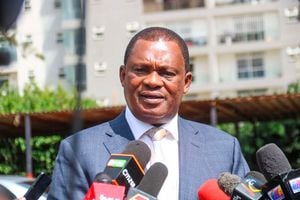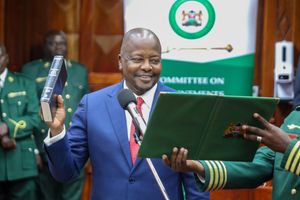Somalia seeks to join African Union Peace and Security Council

Somalia's President Hassan Sheikh Mohamud speaks during a past interview inside his office at the presidential palace in Mogadishu, Somalia on May 28, 2022.
Somalia has launched a campaign to be a member of the African Union Peace and Security Council, a 15-member body charged with deciding policy on stability of the continent.
It means Somalia wants to be both a member of this body as it sits on the UN Security Council as a non-permanent member, having won the UN seat last year for the 2025-2026 term.
The African Union Peace and Security Council often works with, or compliments decisions of the UN Security Council.
Member states of the African Union elect candidates in a rotational format, annually. And elected members serve three-year terms in a staggered formula such that there is always a replacement for those whose terms end. Sitting members cannot be re-elected immediately, an idea meant to ensure all member states have an equal chance of getting elected on the Council.
For Somalia, these two bodies have made annual decisions concerning the Horn of Africa country for the last two decades, including continued deployment of African Union forces in Somalia, now known as the African Union Stabilisation and Support mission (Aussom).
Now Somalia wants to sit on both and announced its candidacy for a seat in the African Union Peace and Security Council (AU-PSC) for the 2025–2028 term. The move is for the Horn of Africa nation to be part in the team that strives to advance peace and stability across Africa, a dispatch from Mogadishu said.
In the statement, Somalia Ministry of Foreign Affairs and International Cooperation highlighted that Somalia’s candidacy was also a matter of equity and inclusiveness, calling for fair representation within the council.
“This is not solely about Somalia; it’s about realising a peaceful and prosperous Africa,” the statement read. Somalia has never served on the AUPSC since it was established in 2004 (it actually began work in 2005).
And Somalia says it has fought back to the international arena, achieving debt relief from creditors after meeting conditions set by International Financial Institutions (IFIs), getting elected to the UN Security Council as well as having sanctions and a weapons embargo on Somalia dropped by the UN Security Council, besides getting admitted to the East African Community.
“As a future UNSC member, Somalia is uniquely positioned to align and advance African priorities on the global stage,” was noted as the simultaneous role having synergetic effects.
Equally mentioned as favourable point, the country’s history of supporting liberation movements, opposing apartheid, and advocating for sovereignty underscores its dedication to the continent’s shared progress.
Somalia’s leadership has positioned this campaign as a reflection of its commitment to Pan-African principles.
“Somalia’s long-standing contributions to Pan-Africanism include supporting liberation movements, fighting apartheid and championing independence and sovereignty across the continent,” the statement pinpointed as the country’s leadership successes.
“With resilience and courage, Somalia is rapidly regaining its status as an influential leader both regionally and globally, transforming into a fast-rising, stable, and sovereign federal republic,” the foreign ministry stressed in its pages.
As a founding member of the African Union (originally, the Organization of African Unity), hosted the 11th OAU summit in Mogadishu in June 1974 where then military leader Major General Mohamed Siad Barre, was elected as Chairman of the summit. He was in this position when former Portuguese colonies, Angola and Mozambique gained independence.
Somalia would later descend into a civil war; whose effects it is still striving to emerge from.





